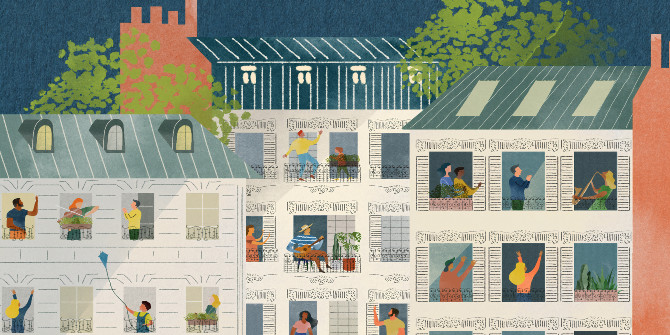 Emma O’Dwyer discusses some preliminary findings on COVID-19 mutual aid groups and explains why the demographic and political characteristics of their members query their capacity to drive intergroup solidarity.
Emma O’Dwyer discusses some preliminary findings on COVID-19 mutual aid groups and explains why the demographic and political characteristics of their members query their capacity to drive intergroup solidarity.
At the outset of the crisis, COVID-19 mutual aid groups (CMAGs) developed across the UK to support vulnerable and shielded members of their communities. At the time of writing, these groups number over 4000 on the central organising website. They are engaged in various activities – fulfilling practical tasks such as grocery shopping and collecting medication, but also providing invaluable emotional support and advice to members of the community, many of whom are struggling with physical and mental health issues as well as economic disadvantage. We have seen a rapid and large-scale mobilisation of community action, but it remains to be seen what the future will hold for this nascent movement. Certainly, it seems plausible that many of these groups, seeing the benefits of their action, may decide to continue their activities, adapting to developing levels of need throughout the pandemic and beyond.
Further, some CMAGs, particularly those in urban centres, conceptualise their work in ideological terms; this conception of mutual aid is rooted in anarchist thought, which underscores the necessity of mutually beneficial reciprocity and independence from formal structures such as the police or local government. In that sense, CMAGs work towards the achievement of a new type of society underpinned by collective solidarity. Consequently, the political implications of this uptake in community activism warrants examination.
By facilitating meaningful contact between advantaged and less advantaged groups, CMAGs have the potential to lead to an increase in intergroup solidarity, particularly on class lines, effectively depleted by neoliberal policies over the past 40 years. If participation in these groups is viewed through the lens of activism, it may lead to greater empowerment, self-esteem, politicisation, as well as sustained commitment, for example. Initial humanitarian motivations to become involved (i.e. to help vulnerable neighbours) could become politicised as new understandings of injustice and inequality are developed, which might in turn motivate solidaristic behaviours and attitudes. However, other, less positive outcomes are plausible. Groups might become proxies for pre-existing political or civil society organisations, which could alienate members with different ideas about what mutual aid should be. More broadly, CMAGs might simply reflect and reproduce existing societal divisions brought into clearer focus by COVID-19.
To address some of these questions, I recently began a longitudinal study of the effects of participation in UK CMAGs with Kingston University colleagues and international collaborators. Our project will address the psychological, social, and political effects of membership of CMAGs using survey methods and interviews with participants across the UK over the course of the pandemic. We have now completed the first phase of data collection and our initial analyses can provide us with some insight as to the potential implications of participation in these groups.
Over a two week period during the initial lockdown phase, we conducted a survey of 854 members of CMAGs, using the central organising website to source the appropriate contact details for each group (generally Facebook and WhatsApp groups). Participants were predominantly white (90%) and aged between 16 and 78 years (M = 47.69, SD = 12.91).
In line with a preliminary analysis of the community response to COVID-19 in the Bristol area, the majority of our sample was female (84%). This could be an artefact of the primary method of data collection, with females tending to use Facebook to a greater extent than males, however it does also chime with recent polling which found that women were significantly more likely than men to have reached out to family members and vulnerable members of the community to offer support.
Participants were mostly middle class. Using the National Statistics Socio-economic Classification, 76% were in managerial, administrative, and professional, occupations, 11% in intermediate occupations, 8% were small employers or own account workers, 2% were lower supervisory and technical workers, and 4% were in semi-routine or routine occupations. Over 60% of participants reported having completed a university undergraduate or postgraduate degree. These findings complement a recent analysis of groups listed on the central organising website, which found that the presence of CMAGs was positively related to measures of socio-economic advantage, happiness and life satisfaction, and the population’s median age at the local authority level.
Are members of mutual aid groups political? In short, yes: 19% of our sample were current members of political parties (membership of the Conservative, Labour and the Liberal Democrat parties was around 1.7% of the electorate in 2019). Participants were overwhelmingly left-wing – we found a mean of 4.90 on the British Election Study measure of ideology, where 1 is very right-wing and 7 very left-wing. However, they did not perceive their mutual aid groups as political. Participants were asked to respond to two statements on a 7-point scale with a higher score indicating greater agreement. They tended not to endorse the following: “My mutual aid group is political” (M = 2.86) and “We often discuss political matters amongst ourselves” (M = 2.28). While members of CMAGs might be more political than the average UK resident then, there seems to be a motivation to keep politics out of the work done by CMAGs. One plausible explanation for this finding could be the motivation to maintain group cohesion and enable immediate and on-going co-ordinated action. However, it is an open question as to the extent to which politics can be kept off the table long-term, given the political characteristics of group members.
This preliminary analysis of the demographic and political characteristics of these members of CMAGs query the capacity of CMAGs to drive intergroup solidarity, given the lack of contact of mutual aid group members with people who are different to them, particularly in relation to class and ethnic background. It raises the related question of whether mutual aid groups might advantage already advantaged communities in relation to their ability to respond to and cope with the pandemic and its economic impact. This suggests that, for CMAGs to engender more solidarity along class lines, they will need to find ways to engage meaningfully with and include people from a wider range of backgrounds. They should also aspire to be effective allies to disadvantaged groups in society – lending their support for action in a way which helps rather than hinders. Otherwise, CMAGs may simply reflect and reproduce existing divisions and inequalities, particularly by maintaining boundaries between those who need help and those who are in a position to provide it.
We will address these issues in much greater depth as we continue to research the psychological, social, and political effects of participation in mutual aid groups across the UK, combining surveys with interviews with group members. Mutual aid, in its clearest articulation, offers the promise of a new type of society underpinned and sustained by solidarity. It would be to the benefit of Britain’s post-COVID society if it could fulfil this promise.
____________________
About the Author
 Emma O’Dwyer is Senior Lecturer in Political Psychology at Kingston University.
Emma O’Dwyer is Senior Lecturer in Political Psychology at Kingston University.
All articles posted on this blog give the views of the author(s), and not the position of LSE British Politics and Policy, nor of the London School of Economics and Political Science. Featured image credit: by Clark Tibbs on Unsplash.








Very interesting. It seems a little in contrast to the older working class based self help groups based on trade unions, chapels, working men’s clubs and educational movements, though many of these were related to the workplace. I wonder if there are wider implications. If these new groupings are overwhelmingly for the educated and left-leaning middle classes is it part of the wider disconnect with Labour’s old heartland vote so that even in a social crisis they tend to either organise separately or perhaps in some places the old organisational structures have died off and little has taken their place.